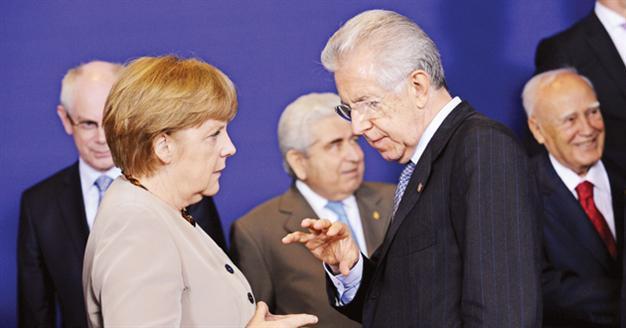EU leaders meet as Germany stands firm
BRUSSELS

German Chancellor Angela Merkel (L) talks with Italian Prime Minister Mario Monti (R) during a family photo after a meeting of European Union leaders yesterday.
The European Union leaders gathered in Brussels today for a two-day summit crucial to the future of the euro in the shade of growing divisions between the two powerhouses of the 17 nation bloc as German leader Angela Merkel once again firmly opposed to throwing money at struggling banks or poorly-run economies.Chancellor Merkel showed no sign of relenting in her refusal to back other countries’ debts at a meeting with France’s just-elected leader François Hollande in Paris a day before the EU summit.
“Nein! No! Non!” shouted a headline splashed across the front page of the normally sober German business daily Handelsblatt, with a commentary by its editor-in-chief saying Merkel must remain firm at the two-day summit.
“I say we need more Europe and I think we are in agreement there. We need a Europe that functions effectively, markets are looking for this, and a Europe where countries help each other,” Merkel said in a brief statement before the Paris meeting.
“This is a summit where we will take important decisions,” said EU president Herman Van Rompuy on opening the EU summit.
“Europeans expect no less from us.”
The 27 EU heads of state and government began talks in the afternoon with the world anxiously awaiting a grand plan to save the single currency from a collapse with unfathomable global repercussions.
European stock markets and the euro slid in anticipation of the summit after a week that saw Greek
Cyprus and Spain, the eurozone’s fourth economy, join earlier victims of the two-and-a-half year crisis, Greece, Portugal and Ireland.
“There will be a domino effect across all of Europe. We need emergency measures,” said Belgian premier Elio Di Rupo as he joined counterparts.
With Italy, the eurozone’s third-largest economy, also under threat, leaders of Europe’s “big two”, France and Germany, headed into Brussels careful to show unity despite their divisions.
“I have come to find very quick solutions to support the countries facing the biggest problems in the markets,” Hollande said in a clear reference to Italy and Spain.
“Growth must be at the heart of our commitments,” Hollande added in reference to a growth pact of between 120 billion and 130 billion euros to be debated at the summit.
Weighing in behind the new French leader, Merkel agreed Europe needed growth to revive sluggish economies economies facing record 11 percent joblessness.
Hollande, along with Italian leader Mario Monti, also favors dipping into the eurozone’s 500-billion-euro rescue pot to help Spain’s distressed banks or buy bonds of virtuous economies whose borrowing costs are soaring due to market pressure.
Greek Cyprus should not take over the rotating presidency of the European Union next month because it has sought emergency funding, the head of a business group linked to Merkel’s conservatives said on June 26.
“This is the paradox of the European Union, that the dog should be put in charge of the supply of sausages!” said Kurt Lauk, president of the economic advisory board of center-right Christian Democrats.
















